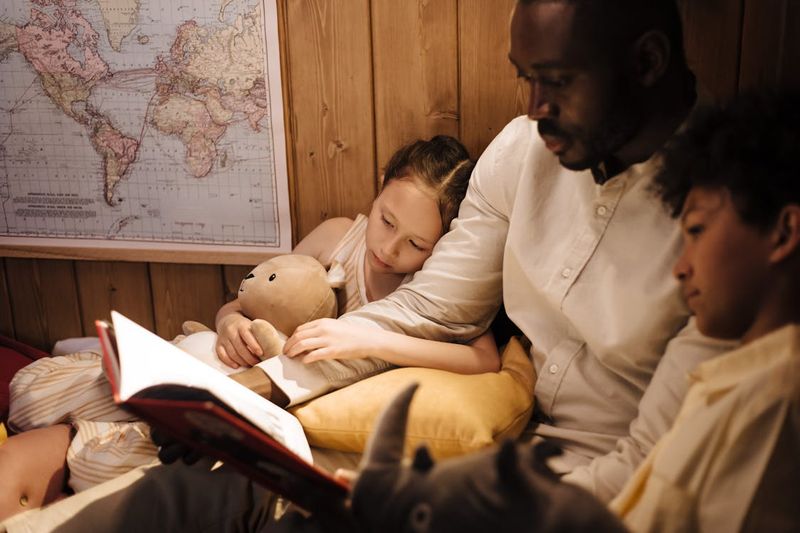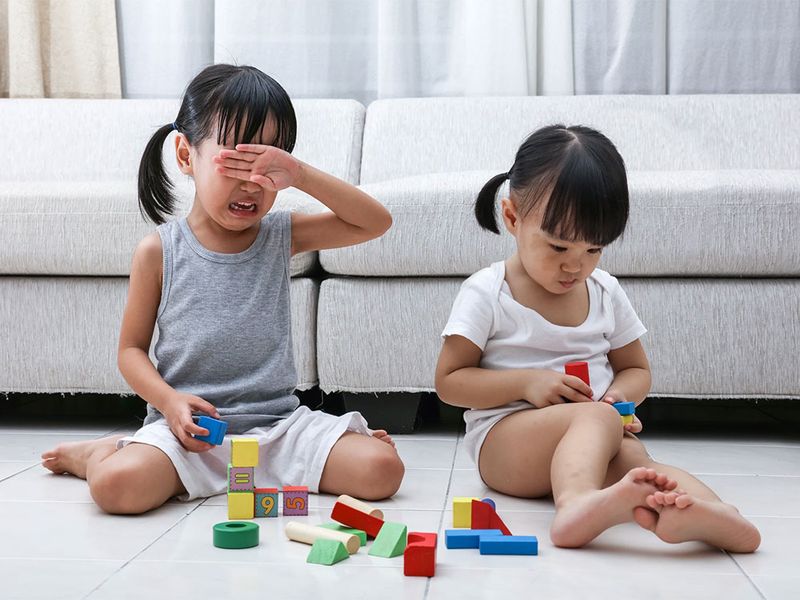18 Parenting Myths You Should Never Follow
Parenting is a journey filled with advice, but not all of it is sound. Let’s debunk 18 common myths that many parents might mistakenly follow, shedding light on the truth behind these misconceptions.
1. Good parents never get frustrated

Ever felt overwhelmed with parenting? You’re not alone. The notion that good parents always stay calm is a myth. Frustration is a natural emotion. Parenting isn’t about being perfect; it’s about handling imperfections. When stress mounts, it’s crucial to take a moment to breathe.
Children need to see real emotions to develop empathy and understanding. It’s okay to show frustration, as long as it’s handled constructively. Rather than hiding it, use it as a teaching moment.
Learning to navigate these feelings is part of parenting. Remember, even the best parents face challenges. Authenticity builds stronger connections with your kids, proving that even superheroes have their off days. After all, nobody’s perfect!
2. Spanking teaches respect

The outdated idea that spanking fosters respect is misleading. Respect stems from understanding, not fear. Open communication and consistent guidance nurture a child’s growth better than physical punishment.
Positive discipline helps children understand boundaries and develop trust. Spanking may yield immediate obedience but doesn’t teach long-term respect. Instead, it instills fear and resentment.
Focus on dialogue and understanding your child’s perspective. This approach not only builds respect but strengthens the parent-child relationship. Consider alternatives like time-outs or natural consequences to guide behavior. Remember, genuine respect is earned, not demanded. Choosing compassion over intimidation is the true path to fostering respect in children.
3. Strict rules create disciplined kids

Contrary to popular belief, strict rules don’t always lead to disciplined kids. Overly rigid boundaries can stifle creativity and independence. Balance is key; providing structure without smothering freedom encourages personal growth.
Children thrive when given the autonomy to make choices within set limits. This empowers them to learn responsibility and self-control. Overemphasis on rules can lead to rebellion or fear of failure.
Engage with your children to set reasonable boundaries together. This collaboration fosters mutual respect and understanding. It’s about guiding, not controlling. By allowing room for mistakes, you’re teaching valuable life lessons. Remember, discipline is more effective when it’s a shared journey, not a dictatorial decree.
4. Kids should always make their parents proud

Kids aren’t trophies meant to showcase parental achievements. The idea that children should constantly strive to make parents proud can create undue pressure. They should be encouraged to explore their passions without the weight of expectation.
Fostering a supportive environment where kids feel free to pursue their interests is crucial. A child’s worth isn’t determined by accolades or accomplishments.
Celebrate effort and growth instead of results. Encourage them to find joy in their journey, not just the destination. By valuing their individuality, you cultivate confidence and self-worth. Parental pride should stem from who they are, not what they achieve. Embrace their uniqueness and cheer for every small victory.
5. Love means giving them everything

Showering children with every material desire isn’t synonymous with love. True love is about time, attention, and shared experiences. Endless gifts can lead to entitlement rather than gratitude.
Children cherish moments spent together over possessions. Prioritize activities that build bonds and memories. It’s the laughter, stories, and adventures that stand out in a child’s mind.
Teach the value of money and the joy of earning something. This instills appreciation and responsibility. It’s not about how much you can give materially, but how much you can give emotionally. Love isn’t measured in things but in meaningful connections and life lessons. By focusing on presence over presents, you enrich their lives.
6. Saying no is harmful

Saying no isn’t harmful; it’s an essential part of parenting. It teaches children about boundaries and the reality of limits. Learning to hear no helps them understand that they can’t always get what they want.
Boundaries provide a sense of security. When children know limits, they explore within safe, defined spaces. Saying no helps develop patience and resilience, crucial life skills.
Rather than fearing no, use it to explain decision-making and consequences. This approach fosters critical thinking and respect. Embrace no as a teaching tool, not a deterrent. It shows care and concern for their well-being, guiding them toward making informed choices.
7. Boys don’t cry

The stereotype that boys shouldn’t cry is damaging. Emotions are human, not gender-specific. Encouraging boys to suppress feelings can lead to emotional struggles later in life.
Allowing boys to express their emotions helps develop emotional intelligence. It fosters empathy and communication skills. Tears are a natural response; acknowledging them is healthy.
Support your son’s emotional expression with understanding and patience. Validate his feelings without judgment. This nurturing approach builds confidence and resilience. Encourage them to articulate and share emotions openly. Emotional strength comes from the ability to express, not hide. By breaking the stereotype, you contribute to raising well-rounded, emotionally healthy individuals.
8. Moms know best—always

The idea that moms always know best is outdated. Parenting is a partnership, and both parents bring valuable perspectives. Collaboration and communication lead to better decision-making.
Respect and trust each other’s instincts and insights. Fathers play a crucial role in child development. Sharing responsibilities promotes balance and harmony.
Parenting is a team effort, not a solo endeavor. Encourage open discussions about parenting strategies and challenges. This cooperation enriches parenting experiences and strengthens family bonds. Dismissing one parent’s input can lead to conflict and frustration. Celebrate each other’s contributions and grow together.
9. Dads don’t need to be nurturing

Contrary to the stereotype, fathers are nurturing too. Paternal warmth is vital to a child’s emotional development. Dads provide comfort, guidance, and security just like moms.
Encourage fathers to engage in nurturing activities such as storytelling or soothing a crying baby. These moments foster deep connections and trust.
Embrace paternal instincts and redefine what nurturing looks like. Children benefit from diverse expressions of care. Fathers’ nurturing roles contribute to balanced upbringing, teaching empathy and compassion. Dismissing dads as mere disciplinarians limits their potential impact. Celebrate their involvement and the love they offer. A father’s embrace is as comforting as a mother’s hug.
10. Kids will remember the big vacations

Children often treasure the simplest moments over extravagant vacations. While big trips are exciting, it’s the little adventures that leave lasting impressions.
Family camping trips or backyard stargazing can spark joy and curiosity. It’s about quality time, not destination. The stories shared around a campfire can become cherished memories.
Focus on creating meaningful experiences rather than elaborate plans. Spontaneous picnics or impromptu dance parties at home can be just as memorable. The key is presence and engagement. Children value the time spent together more than the place. Invest in moments of joy, laughter, and togetherness. These are the true treasures they carry into adulthood.
11. More activities mean smarter kids

Cramming a child’s schedule with activities doesn’t guarantee intelligence. Over-scheduling can lead to stress and burnout. Kids need unstructured time to explore and play.
Free play enhances creativity and problem-solving skills. It allows them to discover interests at their own pace. Balance structured activities with downtime for overall development.
Encourage curiosity and exploration. Children learn by observing, experimenting, and imagining. It’s in these moments that creativity flourishes. Value quality over quantity when it comes to activities. Nurture their innate talents and interests by giving them space to breathe and grow. Remember, learning happens in the quiet moments too.
12. Siblings should always get along

Sibling rivalry is a natural part of growing up. Expecting siblings to always get along is unrealistic. Conflicts can teach valuable lessons about negotiation and empathy.
Encourage open communication and problem-solving among siblings. Guide them in expressing feelings and understanding each other’s perspectives.
Create opportunities for shared experiences without forcing harmony. Allow them to resolve differences with guidance. It’s through these interactions that they learn compromise and compassion. Siblings can be friends and rivals, and both dynamics contribute to their development. Celebrate their individuality while fostering connection. Remember, it’s not about eliminating disagreements but learning to navigate them constructively.
13. If they misbehave, it’s your fault

Children are independent beings with their own personalities. Misbehavior isn’t always a reflection of parenting. External factors and developmental stages influence behavior too.
Focus on understanding the root cause of misbehavior. Engage in open dialogue rather than blame. This approach builds trust and cooperation.
Acknowledge that mistakes are part of growing up. Guide them with patience and empathy. It’s about teaching, not punishing. Every child is different, and comparing them to others is unfair. Celebrate their uniqueness and support their growth. Remember, parenting is about guiding them through life’s challenges, not controlling every outcome.
14. You have to be the perfect role model

Perfection isn’t attainable, and striving for it sets unrealistic expectations. Children learn from both successes and failures. Admitting mistakes teaches humility and resilience.
Show your child that everyone makes errors and that’s okay. It’s how you handle them that matters. This transparency fosters honesty and trust.
Be a role model for growth, not flawlessness. Teach them that learning is lifelong and perfection isn’t the goal. Embrace imperfections with grace and humor. It’s the journey of improvement that inspires. Your genuine efforts leave a lasting impression. By being open about your shortcomings, you teach valuable life lessons about perseverance and authenticity.
15. Teen rebellion means bad parenting

Teen rebellion isn’t a sign of failed parenting. It’s a phase of self-discovery and independence. Teens push boundaries to understand their identity.
Approach this stage with patience and understanding. Open communication is key. Validate their feelings and guide them through challenges.
Create a safe space for them to express themselves. Encourage dialogue without judgment. It’s about supporting them as they navigate this tumultuous time. Remember, rebellion is part of growing up, not a personal attack. By being a supportive presence, you strengthen your relationship. Celebrate their milestones and trust the foundation you’ve built together. It’s a journey of mutual growth and understanding.
16. Praising everything builds confidence

Over-praising can diminish its value. Authenticity in praise is key to building true confidence. Recognize genuine effort and achievements.
Offer specific feedback rather than generic compliments. This helps children understand what they’re doing right and encourages growth.
Confidence stems from overcoming challenges, not constant validation. Celebrate progress and perseverance. Encourage self-reflection and self-assessment. By being sincere in your praise, you teach the value of effort and improvement. Balance praise with constructive guidance. Children flourish in environments where they feel genuinely appreciated. It’s about nurturing their potential, not inflating their egos. Let them earn confidence through their own accomplishments.
17. They’ll outgrow their emotions

Emotions are integral, not temporary hurdles to outgrow. Believing children will simply outgrow them dismisses their significance. Emotional development is ongoing.
Nurture their emotional intelligence by validating feelings. Teach them healthy expression and coping strategies. This empowers them to navigate emotions throughout life.
Provide a supportive environment where they can explore emotions safely. Encourage conversations about feelings and empathy. It’s about equipping them with tools to manage emotions constructively. By acknowledging their emotions, you affirm their experiences. Emotional growth is lifelong, and understanding this helps children become emotionally adept adults. Guide them in developing resilience and emotional strength.
18. Being friends with your kid ruins authority

Being friends with your child doesn’t mean losing authority. It’s about building a trusting, respectful relationship. Friendship fosters open communication and mutual respect.
Balance authority with warmth and empathy. Set clear boundaries while being approachable. This creates a safe space for your child to express themselves.
Authority isn’t about control; it’s about guidance. By being a compassionate ally, you model strong leadership. Teach them that friendship and respect can coexist. Children value relationships where they feel heard and understood. By fostering friendship, you strengthen your influence. Remember, authority rooted in respect is far more effective than authority rooted in fear.







